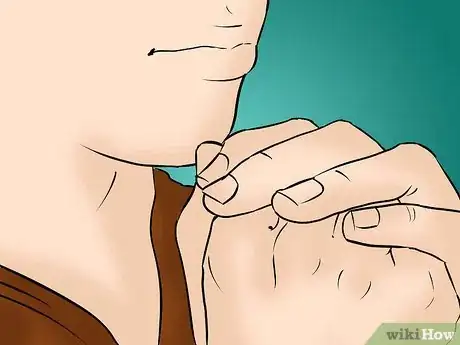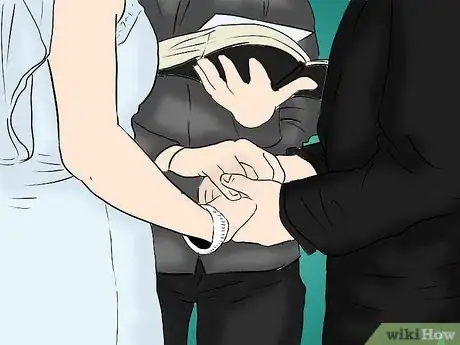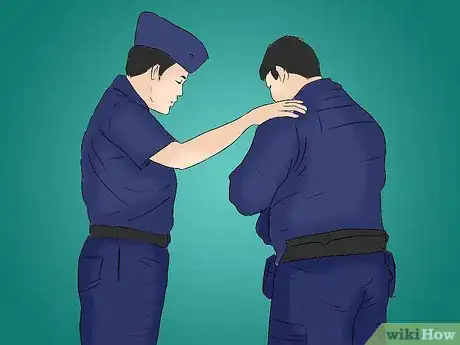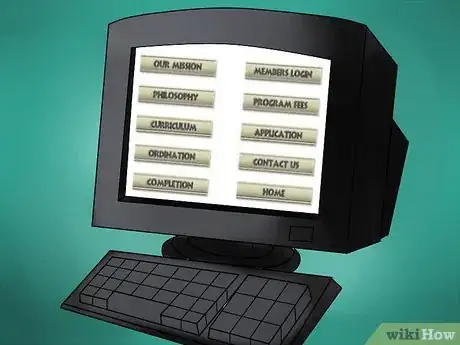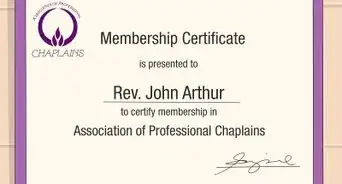wikiHow is a “wiki,” similar to Wikipedia, which means that many of our articles are co-written by multiple authors. To create this article, 22 people, some anonymous, worked to edit and improve it over time.
There are 9 references cited in this article, which can be found at the bottom of the page.
wikiHow marks an article as reader-approved once it receives enough positive feedback. In this case, 91% of readers who voted found the article helpful, earning it our reader-approved status.
This article has been viewed 90,062 times.
Learn more...
Do you feel called to become an ordained minister? Whether you want to become a minister for religious reasons or because you've been asked to officiate a friend's wedding, ordination is a meaningful undertaking that allows you to play a special role in your community. Learn how to become ordained the traditional way or through an online organization.
Steps
Taking the Traditional Path to Ordination
-
1Have a calling. Traditionally, ordained Christian ministers have felt a strong pull to become spiritual leaders. They are members of a particular Christian sect or church and believe that they are meant to serve their communities in the name of God. Services performed by ordained Christian ministers include:
- Performing baptisms.
- Officiating weddings and funerals.
- Providing spiritual counseling.
- Working as chaplains.
- Working as missionaries.
- Founding new churches.
-
2Have a college degree. Traditionally-ordained ministers obtain their licenses through bible or seminary schools, which are effectively graduate programs. Like most graduate programs, entrance into theological programs requires a college degree.Advertisement
-
3Apply to bible school or seminary. Depending on the program, candidates will take courses in theology, philosophy, and other courses meant to provide preparation for a life devoted to religious service. A Master of Divinity degree is awarded at the end of the program.[1]
- Becoming ordained as a minister through school was the most common path before online ordination became possible.
- Receiving ordination through school can take several years, and it can be quite expensive. In some cases, a church or religious community will sponsor a member who feels called to ministry.
-
4Receive your ordained minister license. At the completion of the theological program, an ordained minister license will be granted. This grants you the legal ability to perform marriage ceremonies and other services that fall under the purview of ordained ministers.
-
5Become a minister at a particular church. Churches perform their own ordination ceremonies after an application process has been completed. In most cases candidates will be expected to attend additional classes and undergo a presentation and interview process before ordination is granted by church officials.
- Ordination with a particular church typically means that the church will employ you for your services.
- In addition to conducting religious ceremonies, ministers affiliated with churches usually actively serve their communities by visiting the sick, holding educational programs, leading church trips and so on.
Getting Ordained Online
-
1Have a purpose. People of all religious beliefs and levels of education are free to become ordained ministers. Most people pursue online ordination with a specific purpose in mind, such as an invitation to officiate a friend's wedding or preside over a funeral.
-
2Find an organization that provides online ordination. There are hundreds of organizations to choose from, some religious, some not.[2]
- The Universal Life Church, founded in the fifties, is one of the oldest and most popular sources of online ordained minister licenses.
- The Celebrant Foundation and Institute is a nonreligious organization has potential ministers take online classes on how to create a personal, meaningful wedding ceremony before they are granted ordained minister licenses.
-
3Apply for ordination. Most online ordination applications are short and simple, and they're usually free.[3] Expect to submit the following information:
- Your name, address, and email address.
- An optional reason for pursuing ordination.
- In some cases you may mail a written request for ordination to the address provided.
-
4Wait for your ordination application to be approved. Your application will be reviewed by the organization, and you will receive an email if it is approved.
- Some organizations will send you an ordination certificate and handbook.
- Some organizations offer special packages with additional certificates and accessories.
Using your Ordained Minister License
-
1Know your state laws.[4] In some states, ordained ministers performing a wedding are required to file a copy of their credentials with the state or with the county clerk issuing the marriage license, you could also be asked to submit letters of approval or fulfill other requirements.
-
2Perform ceremonies. Whether you're officiating a wedding or performing a funeral, make sure you know exactly what your role in the process should be, both legally and in your role as a spiritual or celebratory guide. If you don't sign the marriage certificate or fulfill other legal requirements, the marriage may be void.[5]
Community Q&A
-
QuestionHow much does this cost?
 Community AnswerThis depends on the organization through which you're ordained. Some charge a nominal fee (around $25); however some, like the Universal Life Church, are free. Make sure you talk to the marriage licenses department in the courthouse in your area to make sure your ordination is recognized by the state.
Community AnswerThis depends on the organization through which you're ordained. Some charge a nominal fee (around $25); however some, like the Universal Life Church, are free. Make sure you talk to the marriage licenses department in the courthouse in your area to make sure your ordination is recognized by the state. -
QuestionDo all Baptist pastors go to divinity school?
 Community AnswerNo, not necessarily, but this is the most common path for pastors.
Community AnswerNo, not necessarily, but this is the most common path for pastors. -
QuestionDo I have to be ordained to perform a wedding ceremony?
 KeelanCommunity AnswerIn most Christian religions, yes, you do need to be ordained to officiate a wedding. In many states, it is also a legal requirement that you have been ordained in order to perform a legally binding ceremony.
KeelanCommunity AnswerIn most Christian religions, yes, you do need to be ordained to officiate a wedding. In many states, it is also a legal requirement that you have been ordained in order to perform a legally binding ceremony.
References
- ↑ https://www.mastersdegree.net/mdiv-degree/
- ↑ https://getordained.org/
- ↑ https://www.ulc.org/training/ordination-training
- ↑ https://www.themonastery.org/wedding-laws
- ↑ https://www.themonastery.org/training/weddings/performing-a-wedding-3-steps
- https://getordained.org/become-a-minister
- https://www.themonastery.org/ordination
- http://www.ulc.org/2012/09/how-to-get-an-ordained-minister-license/
- http://www.firstnationministry.org/
About This Article
To be an ordained minister, visit the website of an organization that provides online ordinations. Then, fill out the application on their website, which will ask for your name, address, and possibly your reasoning for wanting to be an ordained minister. Once you've completed the application, just submit it and wait to be approved. Once the organization approves you, they'll mail you an official ordination certificate. If you want to learn more, like how to take a traditional path to get ordained, keep reading the article!
